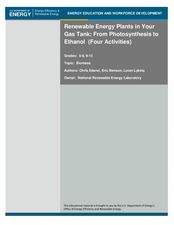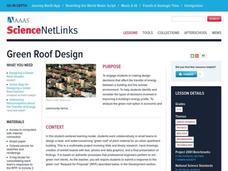Polar Trec
What Is My Footprint?
How do one's habits and lifestyle choices affect the environment? Through a short online survey, learners will calculate their own carbon footprints then determine how to reduce their impact on the environment through simple steps, such...
University of Florida
Understanding Car Crashes: It's Basic Physics!
Make an impact on young physicists with this fun collection of resources. After first watching a video and taking notes on the physics of car crashes, students go on to complete a series of activities that explore the concepts of energy,...
Virginia Department of Education
Aspirin Analysis
Laughter may be the best medicine, but aspirin is also important. Young chemists analyze aspirin tablets using titration in this lab experiment. They then repeat the entire experiment using a different aspirin brand.
Wind Wise Education
What is the Cost of Inefficiency?
What does it cost to keep the lights on? Through a hands-on activity, class members use a watt meter and determine the amount of energy different types of light bulbs use. The class then determines the financial and environmental cost of...
Curated OER
Save a Reef!
Design a public information campaign to improve understanding of the coral reef crisis. Read about and discuss the biology and threats to the coral reef. The class creates a public information program about the problems facing the coral...
SF Environment
Pre-School Composting and Recycling!
You can never be too young to get involved in composting or recycling. Here is a lesson that has been made for the very littlest learners and it's all about the importance of conservation. They'll sort compostable and recyclable objects,...
SF Environment
Sort and Color!
Sorting is a very important skill that can be used in math and even science. Learners get familiar with some environmentally friendly vocabulary terms as they practice separating objects that can be recycled from those that can't. They...
National Park Service
Reduce Our Carbon Footprint, Let’s Compost!
Roll up your sleeves and get a little dirty with this elementary and middle school compost lesson. All you need is a large plastic container, a couple old newspapers, some organic waste, and a few hundred worms and you're ready to start...
College Board
2004 AP® Environmental Science Free-Response Questions
Radioactive isotopes have a wealth of uses, but their waste may cause some concern. One of four free-response questions challenges learners to devise a waste removal strategy for medical radioactive substances. Other questions address...
Curated OER
Energy Efficiency in the Home
Students discover ways to conserve energy in their homes. In this energy efficiency activity students analyze a set of data and design a solution that results in higher energy efficiency.
Curated OER
Renewable Energy Plants in Your Gas Tank: From Photosynthesis to Ethanol
Students examine the role photosynthesis plays in plant survival. In this renewable energy lesson students document their observations and analyze and interpret their results.
Curated OER
Ocean Power
Students explore the energy resources of the ocean. For this energy lesson, students participate in 4 activities focused on energy resources from the ocean.
Curated OER
What's Cooking
Students complete a solar radiation activity. In this solar radiation lesson, students complete an experiment to learn about solar radiation. Students make solar tea by using the energy of the Sun to brew tea.
Curated OER
Survival Still
Students explain how to desalinate water using solar energy. In this solar lesson students complete a lab activity and explain capillary water.
Rice University
College Physics for AP® Courses
Take a look at an organized physics course. The 34-section electronic textbook covers material in AP® Physics 1 and 2. Teachers use the text to supplement lectures and have the class work through the labs. Each section contains multiple...
College Board
AP Physics 1 and 2 Inquiry-Based Lab Investigations
Have you ever wondered what type of AP Physics investigations The College Board wants? This is the guide for you! Sixteen labs covering both Physics I and II will get you started and inspire you to meet the requirement of 25 percent of...
Curated OER
Ultimate Ride Coaster Deluxe
Eighth graders describe the energy transformations as cars travel over a roller coaster. They explain the principle of conservation of energy as it relates to a roller coaster ride. The integration of technology is done using educational...
Curated OER
Building a Roller Coaster
Students describe the law of conservation of energy. They identify the conversion between potential and kinetic energy. They investigate and describe the application of Newton's Laws of Motion.
Curated OER
A Hilly Ride
Fifth graders investigate situations that show how kinetic and potential energy are exchanged. They determine how friction is a source of energy transfer from kinetic to thermal energy by experimenting with a car and track. They answer...
Curated OER
Energy Awareness Quiz
High schoolers examine and become aware of critical energy issues. In this energy awareness lesson students complete an activity sheet and quiz.
Science NetLinks
Green Roof Design
Green roofs aren't just eco-friendly — they are literally green with trees. Groups learn about the concept of green roofs in order to be able to design one. The groups design a 5,000-square-foot green roof for a fictional apartment row...
American Chemical Society
Exothermic, Endothermic, and Chemical Change
Scientists can't observe bonds breaking or forming, so how do they distinguish between exothermic and endothermic reactions? Young scholars complete two experiments to do just that. They monitor temperature change and calculate the...
University of Texas
Lives of Stars
Stars exist from a few million years to over 10 billion years, depending on their mass. Scholars perform a play acting as stars to learn about their different life cycles. They develop an understanding of many of the fundamental concepts...
Curated OER
The Efficient City
Students research and create a realistic plan for energy efficiency. In this investigative activity students answer questions and fill out a worksheet on energy.
Other popular searches
- Energy Conservation
- Law of Conservation of Energy
- Energy Efficiency
- Energy Conservation Plan
- Law Conservation of Energy
- Conservation of Energy Lab
- Conservation of Energy Quiz
- Epa Energy Conservation
- Energy Conservation at Home
- Home Energy Conservation
- Energy Conservation Reading
- Energy Conservation Games

























